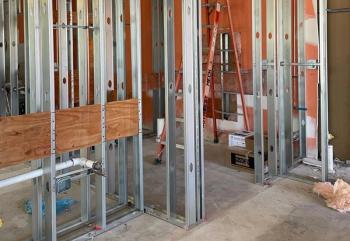
Good advice for great renovations
When you're not ready to build new, you can still expand and impress clients with a new look.
If you're thinking of building a brand-new hospital instead of renovating your current one, you may first want to talk to veterinary architect Dan Chapel, AIA, president of Chapel Associates Architects in Little Rock, Ark. Sure, a good 70 percent of Chapel's business is new hospitals, but he's talked more than one veterinarian into abandoning their plans for contructing a totally new building.
There are lots of reasons to renovate, Chapel says. You may not be able to find a buildable lot in close proximity to your current clients. Or neighbors might block your your zoning variance on a new building site if they worry—unfairly or not—about odors and noise. There's also talk of an economic downturn affecting many areas. "Now's the time when veterinarians' accountants start telling them, 'Put your building project off a year or two. Maybe you could remodel,'" Chapel says.
If you're thinking of building because you lack space, keep in mind that sometimes cramped quarters can be fixed with a well-planned renovation. You can make room for new equipment, exam rooms, or treatment space. Perhaps your retirement-age clientele is traveling more and needs better boarding options—and you could provide them.
So if you're ready to spruce up or expand your current building instead of moving elsewhere, check out Chapel's advice on renovating right.
Care for your clients
In Chapel's experience, practitioners get the most bang for their buck by renovating the areas clients see: signage, landscaping, the building exterior, the lobby, exam rooms, and boarding. But that means clients will be inconvenienced and possibly aggravated. So try to make it fun for all with extra touches:
> Give kids free play tools and hard hats printed with your hospital logo.
> Offer clients coupons for a free car wash if construction is kicking up a lot of dust and mud in your parking lot. (You can usually get a great deal on coupons in bulk from a local car wash.)
> Put plastic booties on dogs that will be walking to and from vehicles outside.
Also, it's nearly impossible to put up too many posters or send out too many mailings letting clients know you'll be renovating. Tell them as often as you can that you're fixing the place up for them and you apologize for the mess. All that apologizing will pay off in the end, Chapel says. "Especially if you spruce up the front of your building, you'll see a spike in business of 25 percent to 30 percent," he says. "There's a group of people out there always looking for new places to go to." Capture those curious clients attracted by the new storefront, and you'll be building toward a banner month—and year.
Inspire your team members
Your staff will be inconvenienced during renovation too, especially if you're knocking down and putting up walls in back areas. Tell team members as early in the process as you can how the changes will make the workdays more efficient, the practice more profitable, and the patients healthier. "Tell them they're wading through the mud so you can have a new CT machine," Chapel says, "and eating sheetrock dust so you can have a new boarding facility."
Cover surprise costs
While an entire renovation project shouldn't cost you as much as building new, it is more expensive per square foot. The work is more labor-intensive, Chapel says. "You can't just get a backhoe into the middle of the building," he says. Workers must manually tear out walls and build them back up, and labor costs are higher these days.
And because surprises can pop up, your contractor may need to change the estimate mid-project. A wall that looked usable may be rotting. Plumbing may be deteriorating. The electrical lines may be inadequate for the new power needs. Some of these things can't be accounted for until the contractor gets started.
To handle these mid-project changes, save up or negotiate with your lender for 10 percent to 15 percent more than you expect to need for a contingency fund. That's easier than trying to scrounge up cash or bargain with the bank in the middle of construction.
Embrace imperfection
Chapel loves the challenge of renovations. He thinks of them as Rubik's Cubes because he spends more time puzzling over them than new builds. Renovations are a maze of columns, corridors, mechanical equipment—even restrooms—some of which can't be moved economically. That means your traffic flow may not be ideal. "It's a lucky, lucky day when a renovation is perfect in terms of the floor plan," he says. For example, a new dental suite may be farther from the treatment area and exam rooms than you'd like. But when the alternative is to relocate walls, corridors, infrastructure, and equipment—and bust your budget in the process—you may find you can live with a small degree of inconvenience.
Budgeting helps veterinarians balance their renovation hopes against the reality of a pre-existing floor plan. "We work things backwards," he says. "How much money is it worth it to invest in the renovation? Will you get your money back?" Don't spend the money to completely reconfigure your space if you can get away with doing less.
Make the right choice
Years ago, a veterinarian far along in his career retained Chapel to plan a new million-dollar hospital. The doctor planned to buy an expensive lot, build his new practice on it, and sell it to his associates. Then he'd retire to the country, build a small house and a small clinic, and practice without the urban headaches. Chapel talked the doctor out of a $1 million project by telling him to "doll up his old building."
See, the urban neighborhood was rundown, but people were buying empty buildings and doing funky things with them. Artists' lofts. Cool restaurants. Maybe the urban rebirth was a few years out of the soon-to-retire doctor's business plans, but it would work for an up-and-coming associate. Chapel told the doctor to "take the majority of the money you're going to spend on the lot and go out and buy land in the country."
Chapel got a call from that doctor six years later: "I owe you a lot of money," the doctor said. A total of $300,000 had funded a great renovation of his existing facility, and his associates snatched it up from him. The doctor then bought more land in the country than he needed for his new, smaller practice. A developer bought half of that empty land, and the doctor retired early and built his "toy hospital" sooner than he thought he could.
If your building's a little small, if your storefront is a little tired-looking, and if you can't quite fit in the new high-tech machine you bought at the latest veterinary convention, it may not be time to build. It may just be time to renovate.
Newsletter
From exam room tips to practice management insights, get trusted veterinary news delivered straight to your inbox—subscribe to dvm360.






